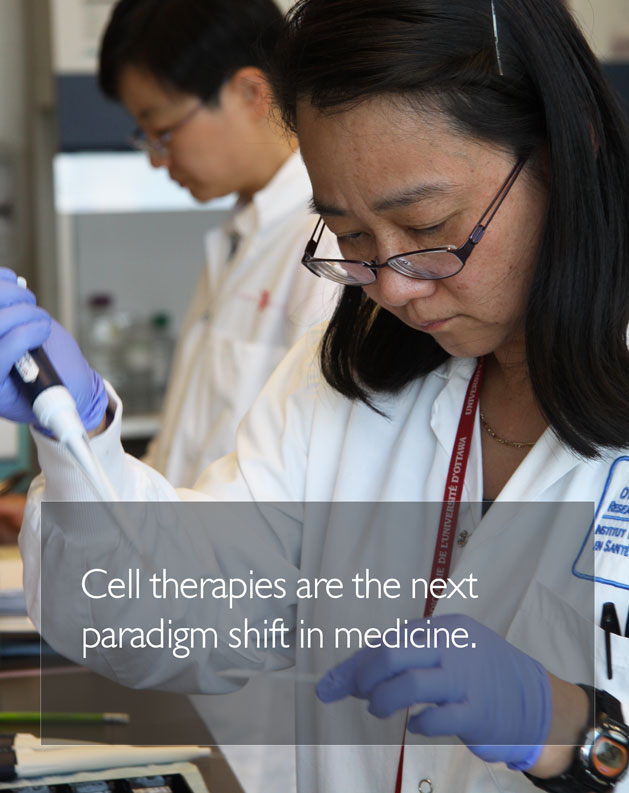
Into the clinic.
Cell and gene therapies have the potential to revolutionize perinatal and respiratory medicine. Over the next 5 years, we will launch early-phase clinical trials to test the feasibility, safety and efficacy of several of these advanced therapies in neonatal lung diseases. Our first study will assess the feasibility and safety of allogeneic umbilical cord-derived mesenchymal stromal cells for BPD.
Research Streams
Mesenchymal stromal cells for lung diseases
 Preterm delivery is a major and growing health care problem. No intervention has been shown to decrease premature birth. On the contrary, the rate of premature birth is increasing; it now affects 10% of all births and accounts for >85% of all perinatal complications and death. Bronchopulmonary dysplasia (BPD), the chronic lung disease of prematurity that follows ventilator and O2 therapy for acute respiratory failure, is the most common complication of extreme prematurity and lacks effective treatment. Despite improvements in perinatal care, there have been no improvements in overall outcome. BPD has long-term respiratory and neurodevelopmental consequences that reach beyond childhood and result in increased health care costs. Recent insight into stem cell biology offers exciting therapeutic avenues for the prevention and repair of lung injury. Our group showed that bone marrow- and human umbilical cord-derived mesenchymal stromal cells (MSCs) prevent and/or repair experimental neonatal lung injury. In addition, contrary to the common belief, we found that cell replacement is not the primary mechanism by which these cells exert their therapeutic benefit. Rather, MSCs act via a paracrine mechanism by secreting factors that protect resident lung cells and allow for lung repair after injury in models of neonatal lung injury, asthma, and acute respiratory distress syndrome. Together with the Ottawa Hospital Research Institute’s Methods Centre, we developed the INCuBATOR (Innovative Neonatal CellUlar therapies for BPD: Accelerating the Translation Of Research), a novel translational engine to mitigate the risks of bringing promising therapies into the clinic by enhancing the speed, efficiency and rigour of this process. We have successfully applied this approach to launch a Phase 1 trial to test the safety and feasibility of cord-derived MSCs in preterm infants at risk of developing BPD (ClinicalTrials.gov NCT04255147).
Preterm delivery is a major and growing health care problem. No intervention has been shown to decrease premature birth. On the contrary, the rate of premature birth is increasing; it now affects 10% of all births and accounts for >85% of all perinatal complications and death. Bronchopulmonary dysplasia (BPD), the chronic lung disease of prematurity that follows ventilator and O2 therapy for acute respiratory failure, is the most common complication of extreme prematurity and lacks effective treatment. Despite improvements in perinatal care, there have been no improvements in overall outcome. BPD has long-term respiratory and neurodevelopmental consequences that reach beyond childhood and result in increased health care costs. Recent insight into stem cell biology offers exciting therapeutic avenues for the prevention and repair of lung injury. Our group showed that bone marrow- and human umbilical cord-derived mesenchymal stromal cells (MSCs) prevent and/or repair experimental neonatal lung injury. In addition, contrary to the common belief, we found that cell replacement is not the primary mechanism by which these cells exert their therapeutic benefit. Rather, MSCs act via a paracrine mechanism by secreting factors that protect resident lung cells and allow for lung repair after injury in models of neonatal lung injury, asthma, and acute respiratory distress syndrome. Together with the Ottawa Hospital Research Institute’s Methods Centre, we developed the INCuBATOR (Innovative Neonatal CellUlar therapies for BPD: Accelerating the Translation Of Research), a novel translational engine to mitigate the risks of bringing promising therapies into the clinic by enhancing the speed, efficiency and rigour of this process. We have successfully applied this approach to launch a Phase 1 trial to test the safety and feasibility of cord-derived MSCs in preterm infants at risk of developing BPD (ClinicalTrials.gov NCT04255147).
Blood vessel forming cells for neonatal pulmonary hypertension
Pulmonary hypertension (high blood pressure in the lung, PHT) is a growing problem in babies with various lung or heart diseases. In babies with lung diseases and reduced lung vascular growth, PHT can double the risk of death. Our group showed that blood vessel growth factors, such as VEGF, regulate normal alveolar development and regenerate alveoli after lung injury. This has led to the exploration of several clinically relevant strategies to promote lung vessel formation with drugs currently used in patients for other indications: sildenafil, adrenomedullin, and L-citrulline. More recently, we discovered that specific endothelial progenitor cells (ECFCs) with high proliferative potential and self-renewal capacity are perturbed in neonatal lung injury characterized by arrested growth and pulmonary hypertension. Cord blood-derived ECFCs restore normal lung growth and improve pulmonary hypertension in these models. We are now adapting our INCuBATOR engine to accelerate the translation of ECFC-based therapies into the clinic with planned Phase 1 studies by 2023. These findings are also relevant for adult diseases with restricted blood supply such as ischemic heart and limb disease.
Gene therapy and induced pluripotent stem cells for genetic lung diseases
The lung delivers oxygen to the body through millions of air sacs (alveoli). Alveoli are coated with surfactant, a mixture of lipids and proteins. Surfactant protein deficiencies are rare but life-threatening and debilitating genetic mutations that account for 10% of all childhood interstitial lung diseases. Babies born with surfactant protein mutations have trouble breathing at birth because the alveoli are collapsed. There is currently no treatment for this disease except lung transplantation, which is not always available. With recent advances, it is now possible to make stem cells from skin or blood cells from any individual. These cells are called induced pluripotent stem cells (iPSCs). These iPSCs can be transformed into any type of cell in the body. Our lab can turn iPSCs into lung cells to better understand the disease and test new genetic tools to correct gene mutations. These genetic tools can then be tested for their feasibility, safety and efficacy in vivo in experimental models. If successful, this may lead to a cure for these lethal and devastating diseases. Ultimately, our findings will benefit other genetic diseases, such as cystic fibrosis, for which there are no treatments today.

